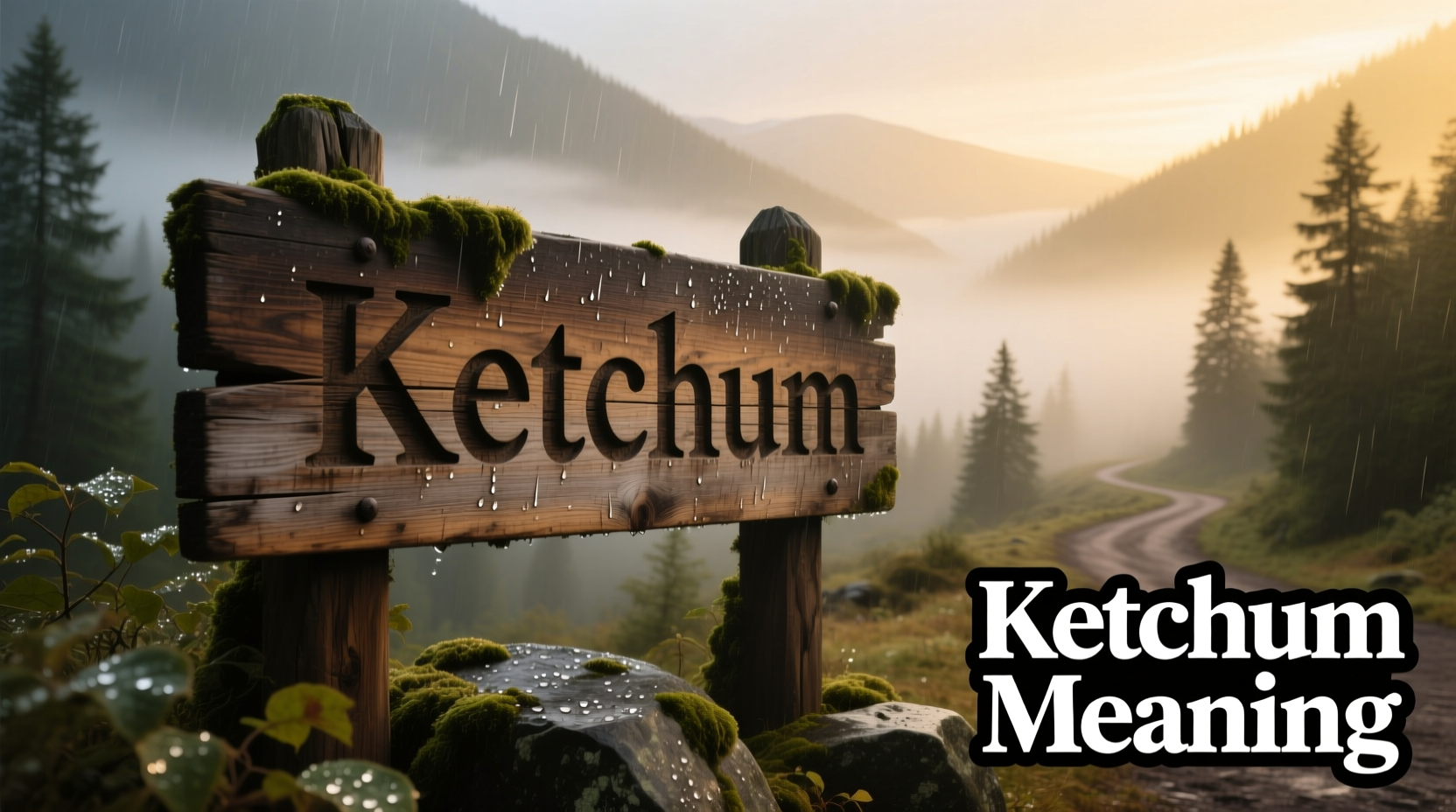Language never sits still. Words shift, meanings stretch, and slang blooms overnight. In this article, we’ll dig deep into the Ketchum meaning of 2025, serve up a refreshed look at hiatus, and arm you with smart alternative phrases so you can express pause or drive with nuance, intention, and flair.
You’ll get:
- A clear definition of Ketchum (yes, slang is real meaning too)
- Its etymological roots, cultural influences, and modern usage
- A crisp breakdown of hiatus: history, meaning, connotation
- A comparison: Ketchum vs. hiatus
- A set of alternative phrases (for both pause and energy)
- A dive into tone, context, register, nuance
- And a view of how linguistic evolution is playing out today
Let’s begin.
What Is “Ketchum”? Core Definition & Connotation
When someone says they’re in “Ketchum mode”, they’re signaling more than just hustle. Ketchum carries a vibe of ambition, relentless pursuit, and youthful energy. It’s become a slang expression that blends cultural reference, identity, and emotional tone.
What “Ketchum” Means in 2025
- To go all in, chase goals relentlessly
- To switch into a hyper-focused state
- To pause something momentarily, reset, then surge (in looser uses)
- To embody determination, passion, and forward motion
In short: Ketchum is *drive expressed as a personality. It’s less about literal definition and more about tone, intent, identity, and expression.
It’s important here to note semantic range: the same word can carry multiple nuances depending on context, register (formal vs informal), culture, and the speaker’s intent.
Etymological Roots & Pop Culture Influence
To grasp Ketchum’s transformation, we need to look at etymology, pop culture, morphological shift, and cultural identity.
Etymological & Proper-Noun Origins
- Ketchum is historically a surname of English origin. (Wikipedia)
- It also refers to places: e.g. Ketchum, Idaho, a small city in Blaine County. (Wikipedia)
- As a proper noun, it carried no slang energy originally — just identity, geography, lineage.
So how did it cross over into slang territory?
Pop Culture Reference: Ash Ketchum & Pokémon
The most influential pivot came via Pokémon. Ash Ketchum is the protagonist in the Pokémon universe. His name is a pun on the series’ slogan, “Gotta catch ’em all!”. It links the surname Ketchum with the action “catch them.” That lends the name built-in action imagery and verb potential.
Over time, fandoms, memes, social media, and youth culture latched onto Ketchum beyond the show. The pop culture reference became the launchpad for slang adaptation.
Hence, Ketchum evolves:
- Surname / place → pop culture icon
- Pop culture icon → metaphor
- Metaphor → slang verb / slang adjective in modern usage
This is a classic case of morphological shift (noun → verb/adjective) and linguistic evolution in action.
Modern Usage: How People Use “Ketchum” Today
Let’s break down how Ketchum functions in real world usage in 2025 — how people speak, text, meme, or post it.
Ketchum as a Verb (Informal)
When you see someone use Ketchum as a verb, it usually means to pursue, chase, or dive into something energetically. Examples:
“I’m going to Ketchum that side hustle this month.”
“She Ketchummed her creativity back after burnout.”
In these cases, Ketchum becomes an action word that captures motion, ambition, and intention.
Ketchum as an Adjective (Slang)
As an adjective, Ketchum describes energy, mood, or style. Examples:
“That presentation had a real Ketchum energy.”
“His mindset lately is so Ketchum — zero play, all grind.”
Here, Ketchum modifies a noun, conveying that something or someone embodies this driven, passionate, intense quality.
Why It Works in Modern Language
Slang thrives on metaphor, cultural references, identity, and emotional tone. Ketchum rides all those waves:
- It carries emotional weight: you sense ambition, passion
- It leans on a shared pop culture reference (Pokémon / Catch ’em all)
- It’s flexible in register: casual in message threads, playful in captions
- It signals identity: using Ketchum says “I’m part of this expressive linguistic culture”
Thus, Ketchum meaning is not in one dictionary. It lives in usage, in community, in language as culture.
What Does “Hiatus” Mean? Etymology, Definition & Usage
To compare Ketchum and hiatus, we first need a solid anchor for hiatus: its definition, history, and connotation.
Etymology & Historical Origin
- Hiatus comes from Latin hiātus, meaning “opening, gap, aperture, cleft.” (Wiktionary)
- That in turn stems from the Latin verb hiare, meaning “to gape, yawn, stand open.” (Etymology Online)
- The root echoes PIE *ghieh- (“to gape, be open”) — same lineage as words for yawning, opening. (Etymology Online)
So hiatus carries the image of a gap, opening, or interruption.
Its first English uses (mid-1500s) described gaps in material objects. By the early 1600s, it extended to interruptions in events or sequences. (Etymology Online)
Definition & Usage
According to Merriam-Webster:
A break, pause, or gap in continuity — often temporary. (Merriam-Webster)
You’ll see hiatus used like:
- “The band is returning after a five-year hiatus.” (Merriam-Webster)
- “We put the project on hiatus while reworking.”
- “She’s on a social media hiatus.”
Connotation: Hiatus usually suggests a pause, not an end. It implies the break is intentional, restorative, or strategic.
In linguistics, hiatus also refers to two adjacent vowel sounds in separate syllables without a consonant (a vowel hiatus). (Wikipedia)
So even within core linguistic and semantic terms, hiatus holds multiple roles.
Ketchum vs. Hiatus: When to Use Which?
Understanding both words means nothing if you can’t differentiate when they fit. Here’s a focused comparison.
Comparison Table: Ketchum vs Hiatus
| Feature | Ketchum | Hiatus |
|---|---|---|
| Core meaning | Energetic pursuit / immersive effort / drive | Pause, rest, break, gap |
| Connotation / Tone | Motivational, passionate, ambitious | Neutral to positive, intentional rest |
| Word class shifts | Noun → verb or adjective (slang) | Noun (rarely verb) |
| Typical usage | Informal, social media, creative speech | Formal, semi-formal, writing, announcement |
| Register / context | Casual, expressive, youthful | Professional, literary, neutral |
| Emotional tone | Intensity, momentum | Reflection, calm, reset |
| Intent | Push forward, commit | Pause to recharge, step back |
| Risk | Can sound hyperbolic or informal in wrong register | May feel stiff or too formal in casual talk |
Why People Flip Between Both
- After burnout, someone may go on hiatus; when they return, they switch into Ketchum mode.
- In creative work, you often need rest (hiatus) to restart with energy (Ketchum).
- The interplay reflects modern life: cycles of pause and push, stillness and storm.
So many digital creators say: “I’m on hiatus right now, but once I’m back, I’ll fully Ketchum it.”
Expressive Alternatives: Phrases That Capture Hiatus or Ketchum Energy
Language gives multiple tools to reflect nuance. Below are alternative phrases you can use instead of hiatus or in Ketchum mode.
Pause / Break Alternatives (Hiatus-Adjacent)
- Taking a breather
- Pressing pause
- On hold
- On sabbatical
- Taking time off
- Stepping back
- Pausing for reflection
- Scaling down
Drive / Ambition Alternatives (Ketchum-Adjacent)
- All in
- Hyper-focused
- Locked in
- Full throttle
- Giving it my all
- In grind mode
- Back in action
- Recharged and running
You can mix and match depending on tone, context, culture, audience.
Example in creative context: “I’m stepping back for a bit (pausing for reflection), so when I return I can go full throttle / in Ketchum mode.”
How Tone, Context & Register Shift Word Choice
Words wield power depending on their setting. Tone, context, register, and intent shape whether Ketchum, hiatus, or an alternative fits best.
Formal & Professional Settings
- Use “hiatus,” “on leave,” “temporary suspension,” or “taking time off”
- Avoid Ketchum here; slang energy can feel unprofessional
- Example: “The CEO is on a short hiatus to focus on strategic vision.”
Casual & Conversational Use
- You’re free to slip in Ketchum mode, pressing pause, stepping back
- Works well in DMs, captions, team chats
- Example: “I’m pressing pause on socials — see you soon, in full Ketchum mode.”
Creative, Passionate Contexts
- Slang thrives. You might say: “Welcome to my Ketchum era,” or “I’m going all in.”
- Expressive language and figurative language / metaphor give life.
- Example: “After my hiatus, I came back with Ketchum energy — no more half-hearted moves.”
Cultural Shift & Language Identity
In 2025, many groups lean toward expressive language as identity markers. Slang like Ketchum builds community, signals tribe, sets tone.
Meanwhile, hiatus retains its stronger footing in formal or neutral registers.
So always ask: Who is reading? What’s the emotional tone? What’s the goal of the communication?
Linguistic Evolution: Why “Ketchum” Is a Sign of the Times

“Ketchum meaning” is a snapshot of how language evolves under cultural pressure, digital trends, and identity-construction.
Slang & Morphological Shift
- Ketchum moves from proper noun → metaphor → slang verb/adjective
- This is classic morphological shift driven by pop culture reference + creative adaptation
- Similar to how “Google” went from noun → verb.
Semantic Spread & Community Use
Words gain meaning through usage, community, creativity. The more people use Ketchum to mean ambition or reset, the more entrenched its lexical meaning becomes.
Language as Cultural Mirror
Your language reflects your culture, identity, values. In digital spaces, expressive slang helps you brand your identity, communicate tone, stand out. Ketchum is more than a word — it’s a badge of energy.
Pragmatics & Contextual Interpretation
Pragmatics studies how context gives meaning beyond dictionary definitions. Someone saying “I’m Ketchumming my life” might imply a complete reboot. Context lets listeners read intent, emotion, nuance.
Thus, Ketchum lives in register, pragmatics, tone, identity — not just dictionary pages.
Summary: Quick Reference Table
| Term / Phrase | Type / Class | Lexical Meaning | Emotional Tone / Connotation | Use-case Example |
|---|---|---|---|---|
| Ketchum | Slang noun / verb / adjective | Ambitious pursuit or intense mode | Energetic, determined | “I’m in Ketchum mode this month.” |
| Hiatus | Noun | A break, gap, interruption | Intentional, neutral–positive | “The band went on hiatus for three months.” |
| Taking a breather | Phrase | Short rest | Gentle pause | “I’m taking a breather — be back soon.” |
| Pressing pause | Phrase | Temporary halt | Casual | “Pressing pause on my content schedule.” |
| On sabbatical | Phrase | Longer break | Formal / professional | “She’s on sabbatical to travel.” |
| All in | Phrase | Full commitment | Motivational | “This year I’m going all in.” |
| Hyper-focused | Phrase | Extreme concentration | Intense | “I’ve been hyper-focused on writing.” |
Conclusion: Balancing Pause & Push in Your Expression
Words like Ketchum and hiatus aren’t just vocabulary — they’re lenses into how we live, rest, and strive.
- Hiatus reminds you rest is valuable, intentional, and sometimes essential.
- Ketchum reminds you drive and passion still matter — that we return stronger.
In 2025, language is cultural, expressive, identity-laden. Picking Ketchum or hiatus is choosing tone, word choice, and emotional register. Use them wisely:
- When you want to pause: lean on hiatus, pressing pause, stepping back
- When you want to surge: slip into Ketchum mode, locked in, all in
Your identity, intent, context will guide you. And language? It’ll keep evolving — and we’ll keep catching up.

DreamOlivers, guided by Tina Hudson, is a spiritual space for inner peace and growth. Offering profound insights, it helps you connect with your higher self. Embrace wisdom and inspiration for a balanced, fulfilling life.

